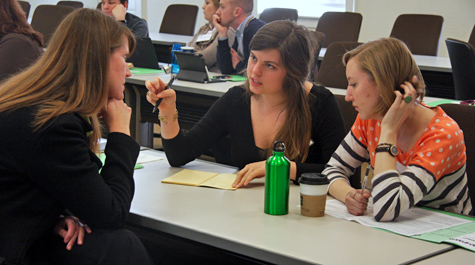Active citizens 'on a mission to change the world'
Approximately 270 students, faculty, staff and non-profit organization members from 40 colleges and universities across the country gathered at the Mason School of Business last weekend for the 2013 Active Citizens Conference.
The conference took place Friday and Saturday and included 35 sessions on issues ranging from social change and creating connections in the community to education reform. United by a desire to help their communities, the participants discussed methods of “educating, uniting, and inspiring active citizens.”
“An active citizen is someone who puts community at the center of their life and their values,” said Elizabeth Miller, who organized the conference with Austin Pryor and others in the Office of Community Engagement (OCE).
“A big piece of it is understanding root causes and the social change you want to see happen, so volunteering is a wonderful piece of that, but active citizenship is taking you beyond that to say why is there this need and how can I be empowered to address that need so that it goes away long-term,” said Miller, coordinator of community engagement.
Societal change starts on campus, Drew Stelljes, assistant vice president for student engagement and leadership and director of OCE, stated in his opening remarks at the conference.
“The next great civil rights movement is playing out on college campuses today and gaining a foothold on city streets and in country churches,” he said.
Jumpstarting change
The Active Citizens Conference is designed to help jumpstart community and national change.
“This is a great event for people who have a passion for changing communities,” Katie Barney, who works for the OCE. “It addresses a bunch of different issues, and it’s just really cool to see so many people active in their communities and the world.”
{{youtube:medium:left|VSIRjYpa4pU, Drew Stelljes' welcoming remarks}}
The conference organizers focused the event around three musical themes this year: “You Say You Want a Revolution,” theories of power, privilege and change; “Stop, Collaborate and Listen,” understanding and impacting community; and “This is How We Do It, “skills of an active citizen.”
Speakers ranged from representatives of Clowns Without Borders to Break Away, a national non-profit organization that helps campuses and communities develop alternative breaks that programs designed to inspire a lifetime of active citizenship.
Representatives from different non-profit organizations were also present with recruiting booths, including the Peace Corps and the George Mason Center for Social Entrepreneurship.
All of the speakers brought their unique skill set and perspectives to the table for all present to learn from and use in their own volunteer experiences.
“It’s really useful like that,” said Elena van den Berg, who also works for OCE. “A lot of times you hear about the beginning or the end of a volunteer project, but you don’t hear a lot about the middle. That’s where everything really gets done. This conference helps you see how to fulfil your goal.”
The conference organizers also included “flipped sessions” at the event, so that all of the attendees’ voices – not just the presenters’ -- could be heard.
“Each [flipped session] has two to three facilitators, but the idea is that those who are coming into the room have the energy and the knowledge so they’re the ones brainstorming,” said Miller.
‘Call us idealists’
The annual conference has evolved and expanded its reach in just the three years of its existence, said organizers.
“Last year, we really saw a jump in seeing more nationwide attendance, which was a wonderful delight to us,” said Melody Porter, associate director of OCE. “To have people come in from around the country with different perspectives, I think it showed us what an important and generative theme this is, that active citizenship is really interesting to people and that students in particular are longing for ways to be active citizens in their lives as students and also in their plans for the future.”
Porter and Miller, who work in the field of community engagement year-round at William & Mary, said that the event is also inspiring to them.
“The energy of people there is so positive, and they are so excited to meet their people,” said Porter.
Emily Neer, a student from Virginia Tech, thought the experience was incredibly useful.
“I’m taking a leadership class back at school,” she said. “But with this conference, it helps bring a connection between the class and real life as a volunteer.”
She plans to use what she learned at the conference to help her on an alternative spring break trip to the Dominican Republic in March.
Also present were students from other universities and non-profit groups, such as Christopher Newport University, Lynchburg College and the Service Scholars program.
Charlotte Proctor, a student from CNU, described the conference as “think-tank style”: bringing together many different viewpoints for the betterment of everyone’s communities.
“This kind of thing brings awareness,” said Elizabeth O’Hara, a student from Lynchburg College. “Like, we have an organization on campus that advocates for the hungry and homeless in our community. One of our students slept outside for a week to raise awareness for those less fortunate around our campus.”
“I know I definitely learned a lot,” Denisse Aquino, also from CNU, added. As a volunteer with a local youth development program, she says that she can take the tactics she learned at the conference to use on future projects.
Miller, who experienced the conference for the second time this year, said that she can see the growth in herself from last year’s event.
“It’s a kind of nice to see how much has changed for me and this is a place to reinvigorate for the year,” she said. “The tagline is uniting, educating and inspiring, and I think that we really do that for people.”
“Call us idealists,” Stelljes declared. “Please do call us idealists. We’re on a mission to change the world.”





















